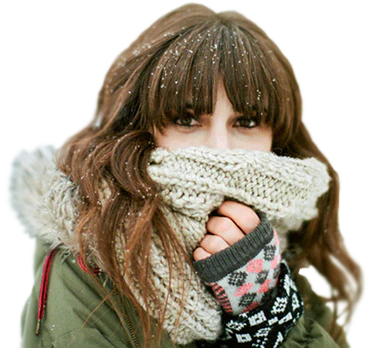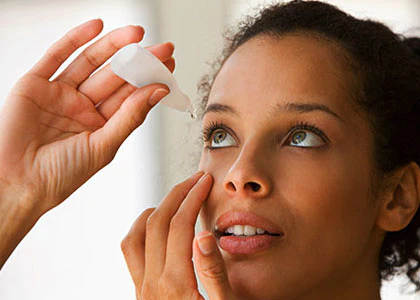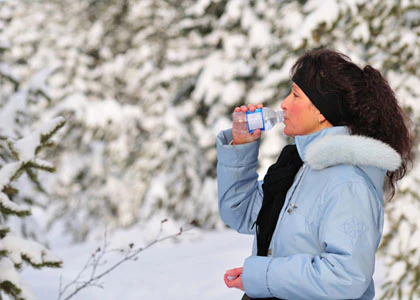We don’t always think about eye health in the winter, but research suggests that it’s one of the most important times of the year to take care of your eyes. Whether you’re hitting the slopes on a clear winter day, heading to work in a snowy commute, or simply cozying up by the fire on a chilly night, keeping your eyes clear and comfortable is easier than you may think.[1]
[1] http://www.fashioncentral.pk/beauty-style/eyes/story-1600-eye-health-tips/

HERE ARE FIVE QUICK TIPS TO KEEP YOUR EYES HEALTHY AND PROTECTED THROUGHOUT THE WINTER MONTHS.
1. Keep Your Eyes Moisturized
Dry air and harsh winds lead to burning eyes, itchiness, and blurry vision during the winter, says Anne Sumers, MD, an ophthalmologist in Ridgewood, New Jersey.
While cozying up in your house may sound like a good idea, indoor heaters eliminate the moisture in the air, leading to burning eyes and blurry vision, explains Dr. Sumers. You may also feel like something gritty is in your eye. “People mistake this for an allergy or infection, but it’s just natural tears drying out,” she explains.[2]
The solution? Sit farther away from heat sources and use artificial tears or a humidifier to alleviate the dryness.[3]
You can purchase artificial tears over the counter without a prescription. However, be sure to stay away from those that tout redness relief because they can be more irritating to your eyes.[4] Relieve eye drops are specifically formulated to help with that blurry vision that you sometimes get from dry winter eyes.

2. Maintain an Eye-Healthy Diet
Research proves that your diet has an effect on your eye health. Omega-3 fatty acids are an effective treatment for dry eye syndrome.[5] These healthy acids are naturally found in foods like salmon, sardines, and tuna.[6] According to the U.S. National Institutes of Health, you should aim for about 3.5 ounces of these fatty fish to get about 1 gram of omega-3s.[7]
Not a fish fan? You can supplement fish by including a dietary supplement formulated for your eye health into your routine, like the Visual Advantage Multivitamin, suggests Liesa Harte, MD, functional medicine specialist and founder of Elite Care in Austin, Texas.[8]

[5] http://www.everydayhealth.com/pictures/keep-eyes-healthy-this-winter/#07
[6] https://www.aao.org/eye-health/tips-prevention/dry-eye-tips
[7] http://www.everydayhealth.com/pictures/keep-eyes-healthy-this-winter/#07
[8] https://www.qualityhealth.com/skin-care-beauty-articles/dry-eyes-winter-effects-cold-weather-indoor-heat
3. Wear the Right Sunglasses
“Sunlight reflected off the snow can actually sunburn the cornea in the winter,” Sumers explains. In fact, snow reflects up to 80 percent of the sun’s UV light, so you’re being exposed to the same harmful rays twice, reports the Skin Cancer Foundation.
So, if you’re skiing in Aspen, protect your eyes from the glare by wearing polarized sunglasses with 100 percent UV protection.

4. Stay Hydrated!
Drinking fluids during the hot summer days is a must, but it’s just as important to stay hydrated in the winter to prevent dry eyes, says Trennda L. Rittenbach, OD, a doctor of optometry with the U.S. Department of Veterans Affairs in Minneapolis and a member of the American Optometric Association’s Evidenced-Based Optometry Committee.
“People forget to hydrate from within,” she says. “Getting enough water daily can make a huge difference, particularly if you are going to be outside in dry and windy conditions.”[9]
[9] http://www.everydayhealth.com/pictures/keep-eyes-healthy-this-winter/#07

5. Give Your Eyes a Break!
If watching hours of Netflix on your laptop while it snows outside sounds like your ideal day, make sure to take regular breaks: Increased time spent in front of the computer can make your eyes become increasingly dry and irritated.[10]
If you notice that your eyes are bothering you, make sure you take some time to shut off the TV or your phone and give your eyes a break. Research shows that you blink 50% less when watching TV or reading, resulting in drier, tired eyes. Making a habit of blinking and resting will allow your eyes to regain moisture that they’ve lost due to the cold winter winds and drying effects of heat.[11]

